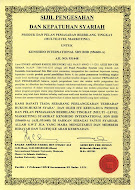Saturday, September 13, 2008
ZAINUL ARIFIN: This is no time to mess with our kids' future
By : Zainul ArifinOBVIOUSLY, opinions are varied on the contentious issue of the teaching of Mathematics and Science in English. People are divided, as they should be, and so let the debate begin. It is better than the latest political shenanigans.
There are, ladies and gentlemen, as they say, statistics and statistics. Now depending on what strokes one's fancy, the glass is either half empty or half full. Hence, the policy is either serving or failing our kids.
Last week, I alluded to the danger of making the right decision based on flawed conclusions. I think this might be the case here, especially when it is widely admitted that one of the main problems is that many teachers lack proficiency in the language. As a result, many seek the easy way out and teach in languages they are comfortable in.
When it was first introduced in 2002, the idea was to have teaching aids, mainly computer software and hardware, which would help teachers and pupils familiarise themselves with the language. Reports now suggest that many of the computers are used for many things but that.
Blaming the previous administration for introducing this policy is disingenuous. Surely, given the situation we find ourselves in vis-a-vis the English language, the idea has merit. These are desperate times, requiring radical ideas without slinking into our comfort zones.
Everyone talks about the need to improve the teaching of English in schools, which surely is our collective wish. But this is something that is nowhere near the horizon now.
If we now are lamenting some teachers' problem with the language even when conducting fact-based subjects, pray tell where are we going to get the teachers who can teach our kids grammar and syntax, not to mention double negatives and alliterations?
English is taught not as a language, but a subject, which one needs to study and cram for examinations. It is even referred to as BI, short for Bahasa Inggeris, which emphasises its alien-ness.
It is only when the medium of instruction of Mathematics and Science is English that it becomes alive as a language.
Now consider this possibility, too: the level of comprehension or comfort in English among Year Six pupils -- those who have lived through six years of the policy -- is better than those before them who had less exposure to the language.
Have there been studies on the state of English proficiency arising from the policy, studies as thorough as the one on the level of achievements in Science and Mathematics?
If my hunch is correct, then obviously, the policy, having met its English language objective, cannot be deemed a failure.
And if that is the case, then we should not ditch it but instead work towards improving it to serve our Science, Mathematics and English objectives better.
Are we using linguists or English experts in developing our children's curriculum to structure a gradual, orderly and pedagogically sound entry into Mathematics, Science and English?
There are arguments that rural, poor children are at a disadvantage when Science and Mathematics are taught in English. This is, of course, a bogey, since who among us would want to deprive our rural, poor brethren of a better future.
Are the rural poor, now working or studying, and having lived through the previous policy, better served by it?
Are their abilities to score in Mathematics and Science, taught in Bahasa Malaysia, Mandarin or Tamil, an advantage when pitted against those slacker urban kids whose only salvation is being glib-tongued in the imperialist language?
Perhaps someone should look at the borrowing habits in our local universities and see how many English reference books, where most knowledge resides, are checked out. Someone should also see whether there is an economic correlation between socioeconomic achievements and English language proficiency.
These are also studies worth doing. Statistics and damned statistics, eh?
Let us look at this issue beyond our obsessions on the number of A's our children get, which is now to be the guiding principle for our decision on the policy. The nation's fate and future cannot be gambled based on our 12-year-olds' results.
Most supporters of the policy are not blind to the fact that it is not perfect and neither are they rabid Anglophiles. Mostly, they are likely to be practical people, parents and employers, who see a problem.
They care about the future of our children, and our country. Parents are rightly emotional on the issue, but they harbour no political agenda and thus need not test the pulse of the electorate to decide. Their constituents are their children.











0 comments: to “ ”
Post a Comment